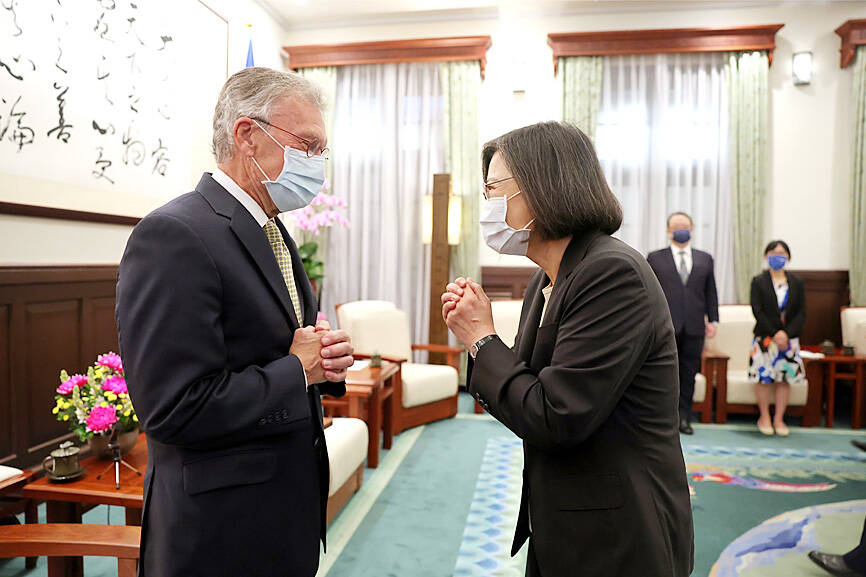President Tsai Ing-wen (蔡英文) yesterday vowed to boost the nation’s self-defense capabilities and uphold regional peace at a meeting with a US delegation at the Presidential Office in Taipei.
“As Taiwan stands on the front line of the defense against authoritarian expansion, we will continue to strengthen our national defense capabilities and resolutely uphold regional peace and stability,” Tsai told the delegation led by Thomas Daschle, chairman of the Washington-based think tank Center for American Progress.
Tsai also thanked US President Joe Biden’s administration “for approving six military sales to Taiwan and for conducting freedom of navigation operations in the Taiwan Strait.”

Photo: CNA
Daschle said the relationship between the US and Taiwan “is unprecedentedly strong” and the US is impressed by the progress of democracy in Taiwan in the past 40 years.
Democracy relies on the strength of national security, he said, adding that he believes Republicans and Democrats, as well as US government officials and members of the US Congress, are all “dedicated to making the region a safer place.”
In addition to democracy and security, the importance of economic power cannot be overlooked, he said.
Noting that Taiwan is the eighth-biggest trade partner of the US, Daschle said he looks forward to continued progress in the US-Taiwan Initiative on 21st-Century Trade and the development of other areas for greater cooperation.

NATIONAL SECURITY THREAT: An official said that Guan Guan’s comments had gone beyond the threshold of free speech, as she advocated for the destruction of the ROC China-born media influencer Guan Guan’s (關關) residency permit has been revoked for repeatedly posting pro-China content that threatens national security, the National Immigration Agency said yesterday. Guan Guan has said many controversial things in her videos posted to Douyin (抖音), including “the red flag will soon be painted all over Taiwan” and “Taiwan is an inseparable part of China,” while expressing hope for expedited “reunification.” The agency received multiple reports alleging that Guan Guan had advocated for armed reunification last year. After investigating, the agency last month issued a notice requiring her to appear and account for her actions. Guan Guan appeared as required,

Japan and the Philippines yesterday signed a defense pact that would allow the tax-free provision of ammunition, fuel, food and other necessities when their forces stage joint training to boost deterrence against China’s growing aggression in the region and to bolster their preparation for natural disasters. Japan has faced increasing political, trade and security tensions with China, which was angered by Japanese Prime Minister Sanae Takaichi’s remark that a Chinese attack on Taiwan would be a survival-threatening situation for Japan, triggering a military response. Japan and the Philippines have also had separate territorial conflicts with Beijing in the East and South China

A strong cold air mass is expected to arrive tonight, bringing a change in weather and a drop in temperature, the Central Weather Administration (CWA) said. The coldest time would be early on Thursday morning, with temperatures in some areas dipping as low as 8°C, it said. Daytime highs yesterday were 22°C to 24°C in northern and eastern Taiwan, and about 25°C to 28°C in the central and southern regions, it said. However, nighttime lows would dip to about 15°C to 16°C in central and northern Taiwan as well as the northeast, and 17°C to 19°C elsewhere, it said. Tropical Storm Nokaen, currently

PAPERS, PLEASE: The gang exploited the high value of the passports, selling them at inflated prices to Chinese buyers, who would treat them as ‘invisibility cloaks’ The Yilan District Court has handed four members of a syndicate prison terms ranging from one year and two months to two years and two months for their involvement in a scheme to purchase Taiwanese passports and resell them abroad at a massive markup. A Chinese human smuggling syndicate purchased Taiwanese passports through local criminal networks, exploiting the passports’ visa-free travel privileges to turn a profit of more than 20 times the original price, the court said. Such criminal organizations enable people to impersonate Taiwanese when entering and exiting Taiwan and other countries, undermining social order and the credibility of the nation’s